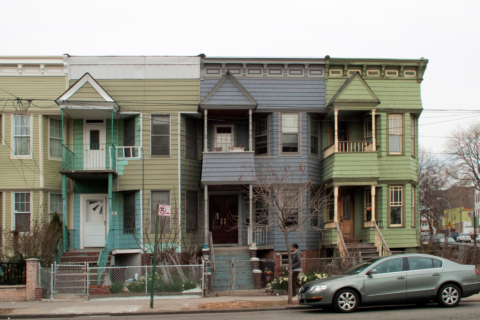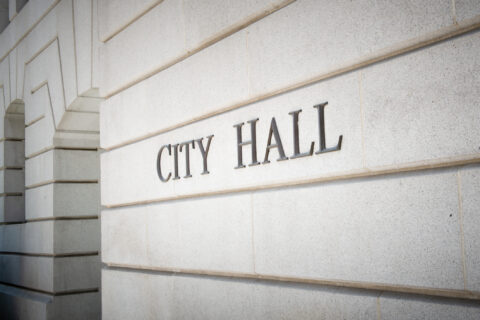The Eviction Prevention Learning Lab (EPLL) is a nationwide peer-to-peer network for cities and their partners to gain exposure to best practices, policies, and tools to prevent evictions. By providing capacity building, human-centered problem-solving work sessions, and opportunities for shared learning, this network helps cities develop and refine equitable interventions that prevent evictions.
With quarterly Learning Lab Meetings that engage experts and organizations working in the field, access to a shared resource hub, and opportunities for cross-city collaboration or hands-on work sessions, the EPLL seeks to equip cities and their partners with the tools they need in order to better address evictions locally. Lessons learned from this network have included how to operationalize racial equity in an eviction strategy; how to facilitate or strengthen relationships with tenants, landlords, courts and community stakeholders; and how to utilize data for developing actionable policy recommendations.
Growing out of work that National League of Cities and Stanford Legal Design Lab (“the Legal Design Lab”) undertook in 2020 with the inaugural Eviction Prevention Cohort, the EPLL application process was open to all cities, with a special invitation to those seeking to confront racial disparities and to build knowledge across agencies and community partners.
The 2021-2022 Eviction Prevention Learning Lab began in March 2021 and ended in October 2022
Access resources developed through the program below and sign-up to join the Eviction Prevention Network Slack Group. The Legal Design Lab hosts this shared virtual workspace to encourage EPLL participants and others working in the field of eviction prevention to connect, ask questions and share resources.
Note: The Eviction Prevention Network Slack Group is open to anyone interested in eviction prevention efforts. The Group and the data collected are managed by the Stanford Legal Design Lab, not by the National League of Cities.
Insights from the 2021-2022 EPLL
The past several years have seen a tide of new programs, policies, and technologies all aiming to prevent evictions in different ways. After working closely with city leaders through the Eviction Prevention Learning Lab in partnership with the Stanford Legal Design Lab, key insights, learnings and approaches have been synthesized to inform the work of other cities and organizations looking to foster housing stability.
Teams from 30 cities in 22 states were accepted into the Eviction Prevention Learning Lab. These selected cities grew out of work that NLC and the Legal Design Lab undertook in 2020 with the inaugural Eviction Prevention Cohort. Explore the participating cities from the 2021-2022 program using the map below.
By providing capacity building, human-centered problem-solving work sessions, and opportunities for shared learning, the EPLL equips cities and their partners with the tools they need to better address evictions locally. Lessons learned from this network include how to operationalize racial equity in an eviction strategy; how to facilitate or strengthen relationships with tenants, landlords, courts and community stakeholders; and how to utilize data for developing actionable policy recommendations.
Benefits for Participating Cities and Partner Organizations
Cities and their local partner organizations received a range of benefits and support through their involvement in the Learning Lab, including:
- Peer-to-peer exchange with other cities in the Eviction Prevention Learning Lab.
- Interactive virtual programming with subject matter experts through quarterly Learning Lab Meetings.
- Periodic one-on-one or small-group workshops and check-in calls to discuss or collaborate around eviction prevention tactics, strategies or challenges.
- Eligibility for up to 10 hours of direct, one-on-one technical assistance.
- Timely and relevant information about eviction during the ongoing COVID-19 pandemic.
- Access to NLC resources and tools through a resource hub and newsletter.
- Local and state policy recommendations to identify targeted opportunities and pathways for reducing eviction rates.
Upon the conclusion of the Learning Lab, participants received access to all of the past content and resources shared or developed over the course of the program through a digital archive. Participants were also invited to join the Eviction Prevention Network via Slack.
Programming Snapshot
Participants of the Eviction Prevention Learning Lab engaged in peer-to-peer learning through quarterly Learning Labs and small group meetings. Over the course of the 18-month program, the EPLL featured:
By the Numbers
7
Learning Labs.
46
Small group meetings by goal area.
4
Additional workshops.
88
Speakers from 73 different organizations.
Speakers included representatives from the following organizations, in addition to staff and local leaders from state, county and local governments across the country.
- Bloomberg Center for Government Excellence
- Carroll School of Management, Boston College
- DataKind
- The Eviction Lab
- Federal Reserve Bank of Atlanta
- Legal Aid Society
- Legal Link
- Legal Services Corporation
- Lubar Center for Public Policy Research and Civic Education, Marquette University Law School
- META Agency
- McCourt School of Public Policy, Georgetown University
- National Center for State Courts
- NAACP
- New America’s Future of Land and Housing
- PolicyLink
- U.S. Department of the Treasury
- And many more!
Requirements for Participation
Cities that participated in the Eviction Prevention Learning Lab were expected to do the following:
- Commit to at least one (1) eviction prevention goal for the next 18 months.
- Identify at least two (2) city staff members to serve as lead participants for the city’s involvement, with additional participation from across city departments, agencies, and local community partner organizations highly encouraged.
- Be an active participant in quarterly virtual programming and online resource-sharing.
- Apply lessons from the Eviction Prevention Learning Lab to their local context.
- Identify, address, and remove racial disparities in their current eviction prevention strategy.
- Commit to creating an equitable eviction prevention strategy that supports both renters and landlords.
- Complete an initial onboarding survey, periodic progress reports and a final feedback survey at the conclusion of the program.
Commitment Goal Areas
Participating cities selected two eviction prevention goals from the list below that they committed to pursuing over 18 months.
- Data – Commit to developing or refining your city’s eviction data collection and analysis process.
- Communication, Outreach and Engagement – Commit to developing or refining your city’s communication, outreach and engagement to both tenant and landlords.
- Diversion Strategy – Commit to developing or refining your city’s eviction diversion strategy to address evictions before an order is filled, during court proceedings, or after a household has been displaced.
- Landlord and Tenant Education – Commit to developing or refining your city’s landlord and tenant education program and strategy.
- Financial, Legal and Social Services – Commit to developing or refining your city’s rental assistance, legal assistance or social service programming to better support renters and landlords.
- Courts Support – Commit to developing, refining or strengthening relationships with your local courts system and court officials.
- Housing Affordability and Stability – Commit to developing or refining interventions that can address housing affordability challenges renters are facing.
- For answers to frequently asked questions about the application process, please see the program FAQ.
- For more information about the program, view the overview document.
- If you have additional questions about the Eviction Prevention Learning Lab, please contact housing@nlc.org.
NLC’s Past Eviction Prevention Work
Learn the stories of success from our 2020 Eviction Prevention Cohort.











